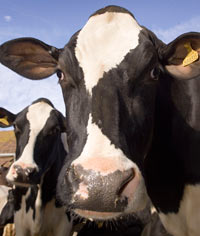Scots eye benefits of TB-free status

Scotland is set to capitalise on its low incidence of bovine tuberculosis by applying to the EU Commission for TB-free status.
Only the reservations of auctioneers and meat wholesalers have delayed the Scottish government from applying for “Officially Tuberculosis Free” status.
The rest of the industry, including the country’s chief vet, Simon Hall, have appeared keen to adopt even tighter measures to keep the disease at bay and give Scotland an edge over the rest of the UK.
“Bovine TB continues to spread in England and Wales bringing significant cost and misery to affected farmers and increasing the potential threat to Scotland,” said Mr Hall.
“If we allowed bovine TB to become established here the bill for Scotland could easily exceed £5m a year,” he said.
Scotland’s current TB status has been influenced by a policy taken two years ago which requires all cattle arriving in the country from high risk areas in England and Wales to be pre- and post-movement tested.
Should TB-free status be granted the likelihood is that all store cattle entering the country – regardless of where they come from – would require pre-movement testing.
Those from high-risk areas and the whole of Wales is now in this bracket, would also require post-movement tests.
NFU Scotland vice president Nigel Miller conceded a TB-free status might create problems for Scottish producers who traditionally source store stock from low-risk areas in the UK. But Mr Miller, who is a beef and sheep farmer and a qualified vet, assured producers that they would have enough time to prepare for a new regime.
“This year’s autumn sales would be unaffected and we would have a period of time to organise sales, whether privately or through an auction ring, to ensure minimal disruption to normal trade,” he said.
“While additional testing for bought-in store stock is the downside for a number of Scottish farmers the upside is that disease-free status may in the future free all Scottish producers from the current compulsory four-year testing regime and the costs that are associated with that.”
There is however a fear in the auctioneering and meat processing sectors that the sustainability of abattoirs and markets could be compromised by the potential reduction in the supply of cattle coming to Scotland.
Detailed economic assessments are now to be made by Scottish government economists before an application for TB-free status is submitted to Brussels.
